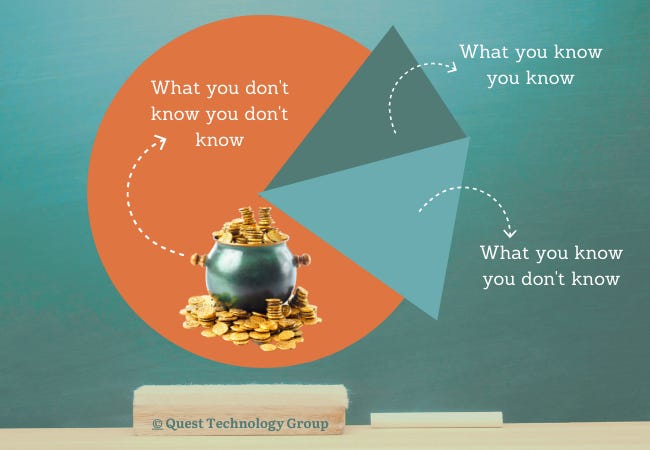How to Know What You Don't Know

Welcome to our weekly digest for business leaders. We talk information, knowledge, tools, resources, and sometimes the technology stuff we all dread to help you and your business thrive.
Feel free to share this or invite a colleague to get their own copy here.

Reading : 3 minutes
. . .
Finding information has never been easier, and our ability to ask the right questions never harder. Our curiosity has been hijacked by our impatience for the quick answer.
Sit with that for a minute.
Your Valuable Knowledge Pie
What you’re missing is the untapped opportunity hidden in what-you-don’t-know-you-don’t-know.

We all know how easy it is to get information about anything we want to know.
Just hop on over to Google and let an algorithm do the heavy lifting for you
Ask a friend who has done it, tried it, asked their friend about it, and therefore, knows all about it
Ask a salesperson if their product or service will deliver everything you need before the day is over
What If You Decided to Be More Patient
Successful people are curious learners. They take the time to think, to sort random information into context, and ask more questions.
Successful people are continually applying information that makes what-you-know-you-know and what-you-know-you-don’t-know larger pieces of their valuable knowledge pie.
Imagine you have a product or service that you believe is a great online offering. Your decision process might begin something like this.
What you know you know
You need a reliable online platform to deliver your offering
There are a lot of established platforms available
You’ve never done this before
You have friends who deliver online services
What you know you don’t know
How much time it will take to launch your new offering (but you’re sure it won’t take that long)
You don’t have a lot of time in your day to devote to research so how will you tackle this
Will researching these platforms be tedious and time-consuming
Are your friends’ offerings and customers the same as yours
What you don’t know you don’t know
How to effectively research and evaluate the available platforms
Google’s answers are only as reliable and on point as the questions you ask
Your friends are telling you what you want to hear
You are letting confirmation bias influence your decision
An online platform adds another layer of complexity to your existing technology framework
You will need to invest more time than you expect in regularly analyzing search results and buyer behavior
Getting found by Google is both art and science. You need to become SEO savvy or hire someone
Building a continuous engagement loop with your customers is essential. The online platform doesn’t do the thinking or the work for you.
And that's how the process begins. You see where this is going.
How to Know What You Don't Know You Don't Know
Back to the original subject of this email. We’ve said this before, but you deserve to hear it often. It’s okay to say, “I don’t know”.
When you become comfortable saying this to the right people, you open the door for opportunities you never knew existed.
1. Challenge your assumptions.
Remember this story I shared recently? Simply checking the corporate bank account convinced this CFO that their company hadn’t been breached. Obviously, this was a flawed – and dangerous -- assumption.
Always be asking yourself “Do I know this is the right assumption”?
2. Build a network of reliable knowledge sources.
These are real people you know who have proven experience. The right people are eager to share what they know with you. Call them, email them, explain the problem you’re trying to solve. Then sit quietly and listen.
You might not hear what you want to hear, but it will most likely be the right, unbiased answer you need to hear. After all, isn’t your ultimate goal to solve the problem that will lead to your desired outcome?
3. Dust off your thinking skills.
Remember back in your school days when you had to write a research paper? Dreaded the whole exercise, right? This torturous paper had to be a certain number of pages, on a specific subject, spacing just so, and your position had to be supported by reliable sources.
Reading and compiling information into a finished work were designed to teach your critical thinking skills.
4. Commit to learning something new every day.
As Charlie Munger, Warren Buffet’s longtime sidekick said ---
“In my whole life, I have known no wise people over a broad subject matter area who didn't read all the time - none, zero. You'd be amazed how much Warren reads - and at how much I read. My children laugh at me. They think I'm a book with a couple of legs sticking out.”.
5. Realize that expertise in something doesn't make you an expert in everything.
. . .
What I've Been Reading
It's not always about business. Fiction writers have a remarkable way with words.
A Visit from the Goon Squad by Jennifer Egan
The World Played Chess by Robert Dugoni
The Judge's List by John Grisham
Show Your Work by Austin Kleon (a short non-fiction I come back to from time to time)
. . .
P.S. --
Thanks for reading! That's all I have for you today. If you have a research project you've been putting off, we might be able to help you.
Linda Rolf
Fractional CIO
Quest Technology Group
407.843.6603
www.quest-technology-group.com
Copyright © *|CURRENT_YEAR|* *|LIST:COMPANY|*, All rights reserved.
*|IFNOT:ARCHIVE_PAGE|* *|LIST:DESCRIPTION|*
Our mailing address is:
*|HTML:LIST_ADDRESS_HTML|* *|END:IF|*
Want to change how you receive these emails?
You can update your preferences or unsubscribe from this list.
*|IF:REWARDS|* *|HTML:REWARDS|* *|END:IF|*



